- Home
- Charles de Lint
Widdershins Page 2
Widdershins Read online
Page 2
“Maybe good luck for us. Anything inside worth nicking?”
Oh, no, Lizzie thought. Her fiddle case was lying right there on the backseat.
“Anybody inside worth eating?” someone added to more laughter.
Lizzie had been about to step out from behind the tree and take the chance that they were more wind than bite, but at that last comment she stayed hidden, pressed herself tightly against the bark, and tried not to breathe.
“There’s food in the boot,” one of them said.
“Anything good?”
“Chokky bars and biscuits . . . oh, and a jug.”
“Lovely, lovely.”
“ ‘Cept it’s just bloody water.”
“Now who’d waste a good jug on carrying about water?”
Lizzie had left the trunk open while she went to have her pee. Maybe they’d be satisfied with what they found in it. Maybe they wouldn’t look in the car itself.
But then she heard one of the car doors open.
“Looks to be our fool’s a musician. There’s a fiddle case just a-lying here.”
“That can’t be right. Where’s the fiddler who doesn’t drink?”
“Better question still, where’s the fiddler?”
All of Lizzie’s bravery had long since fled. There was something not right about these little men.
She’d thought they were midgets or dwarves.
She’d thought they’d come from some Faire.
She’d thought that she wasn’t really in any danger.
But there were no Faires at this time of year—not around here. If there was, she’d know, because her band would probably be playing at it.
And these little men . . . there was a nasty undercurrent to the jovial delivery of their conversation. She could sense it as clearly as she could on those nights when the band just couldn’t connect with a crowd, when nothing you did up there on the stage was right.
“Hiding on us, do you suppose?”
“Unless some green-brees had him for a late-night snack.”
“Don’t even joke about that.”
“Unless he’s not a he.”
“What’ve you got there?”
Lizzie already knew. Whoever was rummaging around in the back of the car must have found her little knapsack with its toiletry bag and change of clothing and underwear in it.
“Nice.”
“I’d like a soiled pair better.”
“Where do you think she’s got to?”
“Prob’bly went looking for help.”
“And left her fiddle behind? Not likely.”
“She carries water around instead of poteen, so she’s not much of a fiddler, is she?”
“I say she’s hiding.”
Lizzie heard a series of wet thumps and realized that they’d dropped their loads of meat in the trunk of the car.
“Let’s have a look-see, shall we?”
Oh god, oh god, oh god.
“Hello, hello, wee fiddler,” one of them called out in a loud voice. “Why don’t you come out and play?”
“Whisht—not so loud.”
“Why not? I want her to hear us.”
Lizzie heard the whack of someone being slapped on the head.
“Ow. What’d you do that for?”
“If you’re that loud, something else might hear us, hey?”
They all fell silent. Lizzie pressed her face against the elm, wishing she had something—anything—in her hand to defend herself with.
But she didn’t.
She had only herself.
Best defense is offense, Johnny would say. If you know you’re in trouble, don’t try talk. Just come out swinging.
She swallowed, her throat and chest tight, and readied herself. She’d slip from behind the tree and charge them, take them by surprise. If she was lucky, maybe they’d run off. If she wasn’t, she’d hurt as many of them as she could. She had good leather boots on and the toes were hard. She made fists with either hand.
But while the little men had been silent, they hadn’t been still.
“What have we here?” a gruff voice asked.
And just like that, the element of surprise was taken from her. She’d never heard them moving through the dry weeds, but here they were, all five of the little men, arrows nocked in bowstrings and aimed in her direction. They stood around her in a half circle. With the elm at her back, there was no avenue of escape.
“Pretty thing,” one of them said with a grin.
She caught only a glimpse, and it was hard to tell with no more than the moonlight behind him to see by, but it seemed that all his teeth had been sharpened to points.
“But big.”
“Ah, they’re all big, her kind.”
They were lowering their bows, one by one, letting the strings go slack. Sure they had her. Sure of themselves.
“I like ‘em big,” the smallest of them said.
The others laughed. Perhaps it was the way he’d said it—as though he was trying to impress his companions, more than her. One of the others gave him a light cuff across the back of the head.
“You wouldn’t know what to do with her,” he said.
“Bit of a laugh that hair of hers.”
She’d dyed her normally black hair a brilliant scarlet a month or so ago, but the black roots had grown out now.
Go ahead, she thought. Have a good look. Get all stupid and confident.
“Only hair I’ll be looking at is down below.”
“ ‘Less she’s the kind that shaves.”
“Are you that kind, girl?” the one closest to her asked.
He moved toward her and she took her chance. Before any of them could react, she took a step forward. Using the momentum of her forward motion to add even more force to the blow, she drove the toe of her boot into his groin.
“How’s that for between the legs?” she cried above his shriek of pain.
She didn’t wait to see the result. Turning, she hit the one on her right square in the face with a cross blow. Felt his nose collapse. Turned again toward the next, right arm cocked, only to find herself staring straight at three arrowheads, bowstrings pulled taut behind them.
“Shouldn’t have done that,” the little man in the center said. “We were only going to play a little with you.”
“Were,” the one on the right said.
The one on the left nodded. “But now you’re meat, girl.”
“We’re all meat, you little freaks,” a new voice said.
Lizzie had no idea where he’d come from, a tall Native man in jeans and a checkered shirt, with long black hair and coppery skin. One moment she was alone with her attackers, the next he was standing behind the center one. But she didn’t stop to work it out.
With the little men distracted, their bows lowering as they turned to the newcomer, she charged the one on her right and drove him to the ground, pounding him with her fist. She heard cries, the sound of punches. When she looked up from her own foe, the other two men were also down, the stranger standing above them. The one she’d kicked earlier was still lying in the dirt, moaning, legs pulled up, hands on his groin. The one whose nose she’d broken was pulling the long knife from his belt. Before he could get it free, the stranger stepped in and knocked him to the ground with a flurry of blows.
“The thing is,” he said as his assailant dropped, “some meat fights back.”
One of the men he’d knocked down earlier lifted himself from the ground by straightening his arms under himself. He spat on the ground, blood and a tooth, small eyes dark with fury.
“Eat my shite, you grand pluiker,” he muttered.
And then he disappeared.
Lizzie’s eyes widened, not sure she’d seen what she’d seen. But then the little man she was still sitting on vanished as well. She scrambled to her feet as though she’d had an electric shock. As she watched, the other three disappeared, one by one.
“How . . . ?” Lizzie turned in a slow circle, trying to under
stand.
“It wasn’t magic,” her rescuer said. “They just moved between.”
“Between? Between what?”
“This world and the other.”
Lizzie slowly shook her head. “This isn’t happening.”
“ ‘Course it’s not. That your car?”
She nodded, her attention on one of the abandoned bows. It wasn’t much longer than her own fiddle bow, but sturdier, and certainly deadlier. She toed it with her boot. It seemed real.
“What’s wrong with it?” the stranger asked.
She looked up, confused. The bow seemed intact. What was wrong was that it was even here in the first place. It, and all those little men, and this mysterious stranger . . .
“Your car,” he said. “What’s wrong with your car?”
“I don’t know,” she finally managed.
“Let me have a look.”
She trailed along behind him, stepping over the ditch and onto the road.
“Who were those . . .”
She reached for a word, still feeling lost and stupid. She had to grip her hands and hold them against her chest to try to stop them from shaking.
“Those dwarves?” she finally said.
“They were bogans, not dwarves,” the stranger said. He was looking under the hood of her car without apparently needing a flashlight. “There aren’t many dwarves around here and, anyway, they’ve much better manners. And they don’t poach.”
Poach? Lizzie thought. But then she remembered what the little men had been carrying when they first showed up.
“Looks like your alternator’s crapped out on you, so your battery hasn’t been getting any juice.”
“Can you fix it?”
He lifted his head from where the was studying the engine to look at her.
“Not permanently,” he said.
He put his hand on the manifold and the engine coughed, then started up. Lizzie stared at the car. The motor seemed to be running more smoothly than it had in years.
“What did you just do?” she asked as he closed the hood.
He gave her a thin smile. “Now that was magic. It’ll hold until you get to wherever you’re going so long as you don’t turn the engine off.”
“But—”
“Where were you headed?”
“I was on my way to Newford from Sweetwater, but maybe I should go back if the car’s not really fixed.”
No, it had been magicked and what did that mean, anyway? Hopefully, she’d already fallen asleep in the back of the car and was dreaming all of this. Maybe she’d never left the bar. Maybe she was actually sleeping upstairs in the room she was supposed to be sharing with her cousin Siobhan. Except, could you know you were dreaming if you were dreaming?
“What’s in Sweetwater?” the stranger asked.
“A gig. We played at the Custom House tonight, and we’re supposed to play again tomorrow night and Sunday.”
He nodded. “I’d take your car to the garage at the corner of Willis and the highway, just after you’ve come into town. They’re cheap and they do good work.”
“I will.”
“So you’re a musician? What kind of music do you play?”
“Celtic stuff—you know, jigs and reels, a few songs. We also do some original material.”
Although the moon was bright enough to see by, she couldn’t read much on his face. His features were too still. But she got the sense he disapproved. Or maybe it was just that he didn’t like her.
“Get into a fix like this again,” he said, “and you should try whistling some of that music. Even bogans are suckers for anything that reminds them of their homeland.”
“You called them that before. What are bogans?”
“A kind of fairy. You people brought them with you when you came in your big ships. Bogans and every kind of fairy freak.”
Lizzie knew that a lot of Native Americans harboured a grudge against Europeans, and rightly so, she supposed, all things considered. So she thought she understood his anger. But all this talk of fairies didn’t make any kind of sense.
“Fairies,” she said.
“Oh, yeah. And as you can see, they’re not all tiny little things living in flowers and sipping nectar from acorn cups.”
“But—”
“I’ve got to go. Your car’ll get you back to Sweetwater. Just remember: don’t turn it off until you’re actually at the garage because it won’t start again until they fix it.”
She nodded. “I won’t. Wait,” she added as he started to walk away. “I didn’t get a chance to thank you.”
“You don’t need to.”
“I’d probably be dead if you hadn’t come along.”
Because you can die in a dream, right?
“Maybe, maybe not,” he said. “You were handling yourself pretty well.”
He started to turn again.
“Wait,” she repeated. “At least tell me your name.”
“You don’t need my name.”
“But—”
“You want my advice, you get in that car. You go home or wherever else it is that you need to be, and you forget about all of this.”
“God, how am I supposed to do that?”
“Not my problem.”
“Look, I—”
But she was talking to an empty road. As suddenly as the mysterious stranger had appeared, he was now gone. He’d vanished, just like the little men had—the bogans, as he’d called them. Here, then, poof. Gone. Not even poof. Just . . . not here anymore.
She looked around herself. Everything seemed so damned normal.
But it had happened.
The soft murmur of her car engine proved it. She walked slowly around to the back of the car. The car’s engine running, and the meat the little men had dumped in her trunk, because it was still there, raw and bloody.
Enough, she told herself. Wake up already.
But the dream wasn’t going to let her go that easily.
Fine. She’d play it out, the way you did with a tune that you couldn’t get out of your head. She’d get back in the car and return to Sweetwater. And maybe then she’d finally wake up.
Except, dream or no dream, she couldn’t drive with that meat in her trunk.
Her first impulse was to simply dump it on the side of the road. She actually had a piece in her hands, meaning to do just that. It felt horrible, slick and bloody, hard to hold. A dead weight.
She let it fall back into the trunk and picked up her collapsible shovel. Unfolding it, she locked the two halves of the shovel in place, then crossed the road and went back over the ditch until she was standing under the naked boughs of the elm tree once more. She pushed around in the dirt until she found a spot that didn’t have a big root and started to dig.
Ten minutes later she was ready to start hauling the deer parts from her trunk to the hole she had dug. When all three pieces were in the ground, she shovelled the loose dirt back on top, patting the rounded mound with the flat of the blade to tamp it down. It didn’t seem right to stomp on the loose dirt with her boots.
She stood for a few moments when she was done, holding the shovel. The night was so quiet. A breeze rustled the twigs on the branches above her, and whispered through the dry weeds. There was a scatter of cloud, but mostly the sky was clear, the stars bright, the moon lowering to the horizon. She wasn’t shaking anymore. The aftereffects of her adrenaline rush had completely gone, leaving her only tired.
Finally she went back to the car, collapsed the shovel, and dropped it into the trunk. It was a mess in there, pooled blood and dirt, but she wasn’t about to try to clean it now. She got out a rag and the water bottle and washed off her hands, drying them on the rag.
The car still purred, the engine running smoothly. She had a momentary worry that it might run out of gas, but then she realized it probably wasn’t running on gas anyway. She remembered her rescuer putting his hand on the engine to start it up, then saying to her, Now that was magic.
Dr
eam magic.
The car would run until she woke up.
She looked at the elm, but knew she couldn’t go yet. There was still something unfinished. It took her a moment to decide what.
She took her fiddlecase out of the back of the car and laid it on the hood, opening it. Got the bow from the lid, used the frog to tighten the hairs. Ran her fingers across the strings to check the tuning. Finally, she went back across the road to the elm and stood over the little mound of earth with her fiddle under her chin, bow in hand.
What to play?
The first thing that came to mind was a song that the band did. It was about a hare that lost its life in a hunt, not a deer, but maybe that was close enough. She started to play, slowing the tune down so that it was like an air. A lament.
Closing her eyes, she played it through three times, the notes of her fiddle weeping for the dead flesh she’d buried, for the live creature it had been, cut down by the little men’s arrows. The breeze caught the music and took it away, across the fields to where a dark smudge of forest came down from the hills to meet the expanse of dried weeds and leafless bushes that lay between their trees and the road.
She held the last note, lightening the pressure of her bow on the strings until the note whispered away into silence. She tucked the fiddle under her arm and let the bow dangle from her forefinger. Opening her eyes, she regarded the little mound of dirt.
There, she thought. Now that felt right. Nothing should have to die, hard and alone, with no one to mourn their going. Not even in a dream.
She started to walk back to the car, then paused, realizing that, once again, she was no longer alone. Her pulse quickened as she turned. The moon was almost gone now, the night much darker than when her car had first broken down. At first she thought it was a huge deer standing behind her. Then she realized it was a man. Or at least the shape of a man, dressed in tunic and trousers of some kind of light-coloured cloth that made his skin appear to be very dark. On his shoulders he wore a headdress of a deer’s head, the tines of his antlers rising up into the starry sky like a smaller version of the elm at her back.
There was just enough light for her to see the glisten of tears on his cheeks.
“That was kindly done,” he said.
When she saw the lips move, she realized it wasn’t a mask, but for some reason that didn’t trouble her.

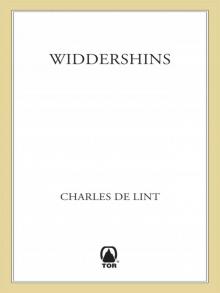 Widdershins
Widdershins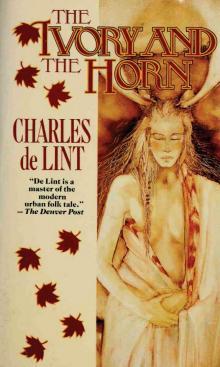 The Ivory and the Horn
The Ivory and the Horn Yarrow
Yarrow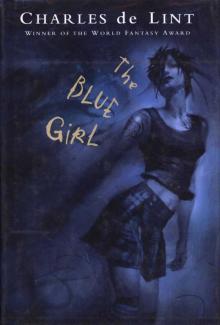 The Blue Girl
The Blue Girl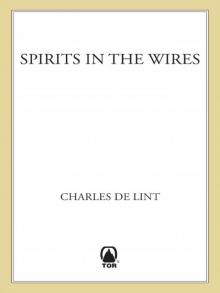 Spirits in the Wires
Spirits in the Wires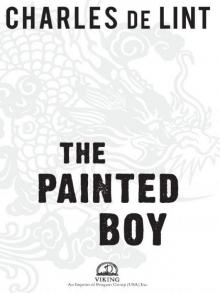 The Painted Boy
The Painted Boy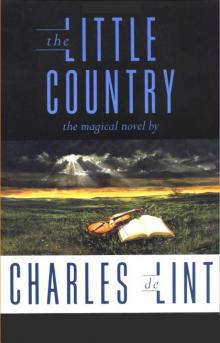 The Little Country
The Little Country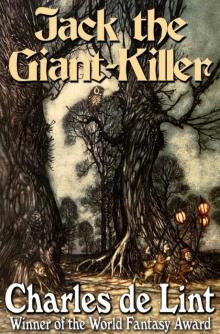 Jack of Kinrowan: Jack the Giant-Killer / Drink Down the Moon
Jack of Kinrowan: Jack the Giant-Killer / Drink Down the Moon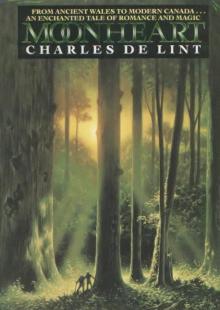 Moonheart
Moonheart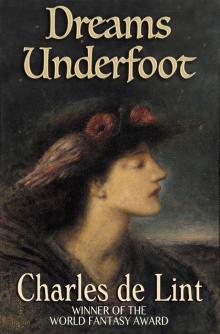 Dreams Underfoot
Dreams Underfoot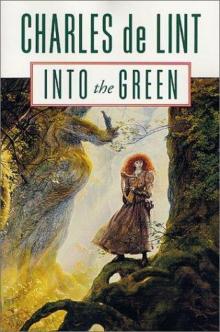 Into the Green
Into the Green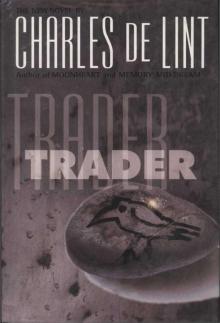 Trader
Trader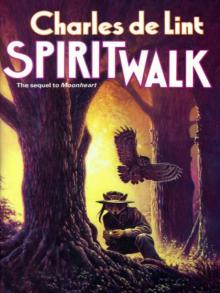 Spiritwalk
Spiritwalk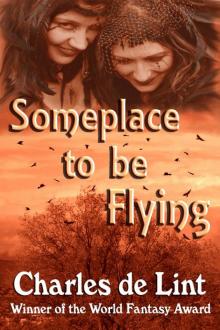 Someplace to Be Flying
Someplace to Be Flying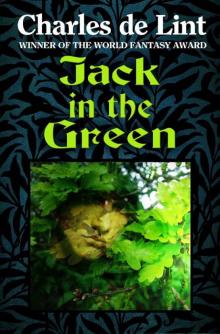 Jack in the Green
Jack in the Green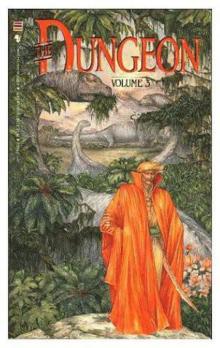 The Valley of Thunder
The Valley of Thunder Out of This World
Out of This World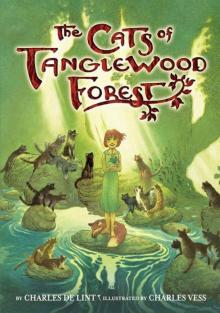 The Cats of Tanglewood Forest
The Cats of Tanglewood Forest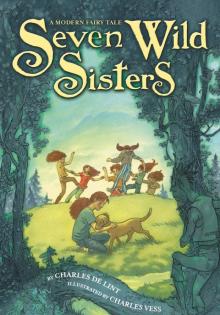 Seven Wild Sisters
Seven Wild Sisters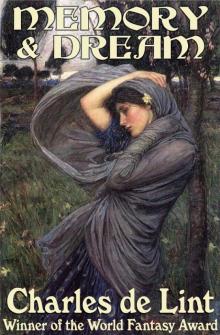 Memory and Dream
Memory and Dream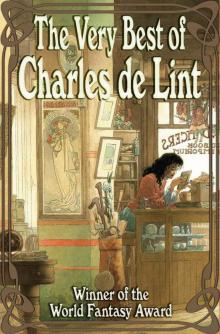 The Very Best of Charles De Lint
The Very Best of Charles De Lint Under My Skin
Under My Skin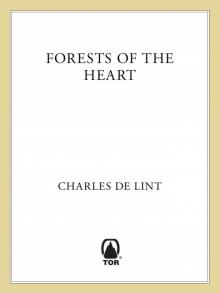 Forests of the Heart
Forests of the Heart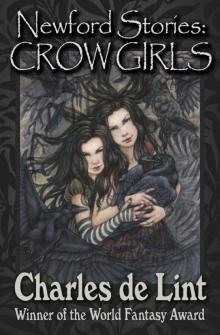 The Newford Stories
The Newford Stories Moonlight and Vines
Moonlight and Vines Angel of Darkness
Angel of Darkness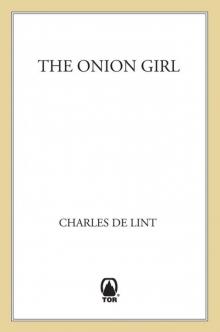 The Onion Girl
The Onion Girl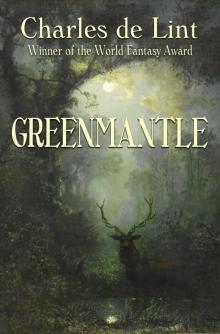 Greenmantle
Greenmantle Waifs And Strays
Waifs And Strays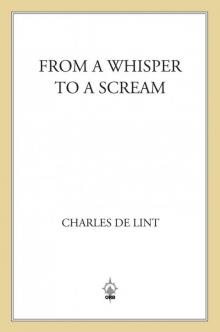 From a Whisper to a Scream
From a Whisper to a Scream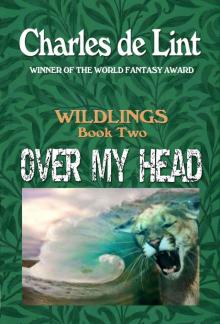 Over My Head
Over My Head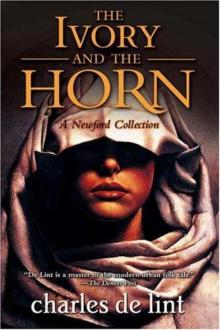 The Ivory and the Horn n-6
The Ivory and the Horn n-6 Our Lady of the Harbour
Our Lady of the Harbour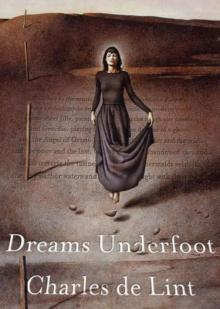 Dreams Underfoot n-1
Dreams Underfoot n-1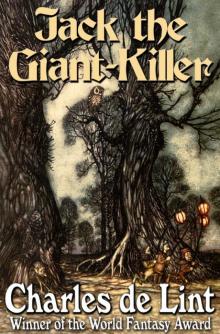 Jack the Giant-Killer (Jack of Kinrowan Book 1)
Jack the Giant-Killer (Jack of Kinrowan Book 1)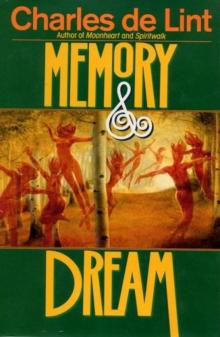 Memory and Dream n-5
Memory and Dream n-5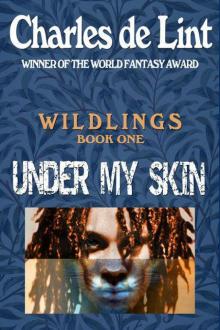 Under My Skin (Wildlings)
Under My Skin (Wildlings)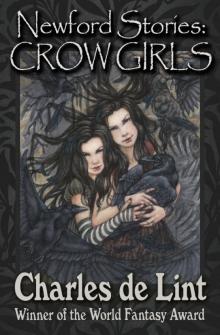 Newford Stories
Newford Stories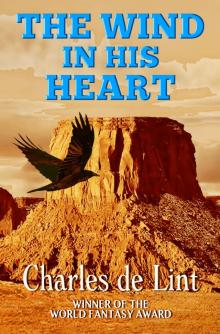 The Wind in His Heart
The Wind in His Heart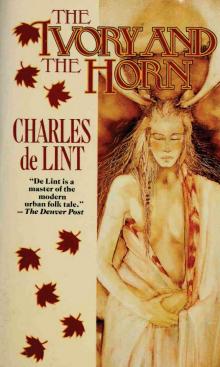 Ivory and the Horn
Ivory and the Horn